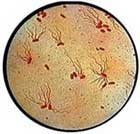Skip subpage navigation

Typhoid feverGoes to CDC Website is a life-threatening illness caused by the bacterium Salmonella Typhi. An estimated 5,700 cases occur each year in the United States. Most cases (up to 75%) are acquired while traveling internationally. Typhoid fever is still common in the developing world, where it affects about 21.5 million people each year.
Persons with typhoid feverGoes to CDC Website usually have a sustained fever as high as 103° to 104° F (39° to 40° C). They may also feel weak, or have stomach pains, headache, or loss of appetite. In some cases, patients have a rash of flat, rose-colored spots. The only way to know for sure if an illness is typhoid fever is to have samples of stool or blood tested for the presence of Salmonella Typhi.
CDC recommends typhoid vaccine for travelers to areas where there is an increased risk of exposure to S. enterica serotype Typhi. Two typhoid vaccines are available in the United States:
- Vi capsular polysaccharide vaccine (ViCPS) (Typhim Vi, manufactured by Sanofi Pasteur) for intramuscular use
- Oral live attenuated vaccine (Vivotif, manufactured from the Ty21a strain of serotypeTyphi by PaxVax)
Both typhoid vaccines protect 50%–80% of recipients; travelers should be reminded that typhoid immunization is not 100% effective, and typhoid feverGoes to CDC Website could still occur. Available typhoid vaccines offer no protection against paratyphoid fever.
Remember that you will need to complete your vaccination at least 1-2 weeks (dependent upon vaccine type) before you travel so that the vaccine has time to take effect. Typhoid vaccinesGoes to CDC Website lose effectiveness after several years; if you were vaccinated in the past, check with your doctor to see if it is time for a booster vaccination. Taking antibiotics will not prevent typhoid fever; they only help treat it.
You will find below all of the resources you will need about the typhoid vaccine. More will be added as they are published or released.
You also may be interested in...
Fact Sheet
Aug 16, 2017
 .PDF |
44.47 KB
.PDF |
44.47 KB
This information paper describes typhoid fever and the vaccines to prevent it
You are leaving Health.mil
The appearance of hyperlinks does not constitute endorsement by the Department of Defense of non-U.S. Government sites or the information, products, or services contained therein. Although the Defense Health Agency may or may not use these sites as additional distribution channels for Department of Defense information, it does not exercise editorial control over all of the information that you may find at these locations. Such links are provided consistent with the stated purpose of this website.
You are leaving Health.mil
View the external links disclaimer.
Last Updated: August 28, 2024